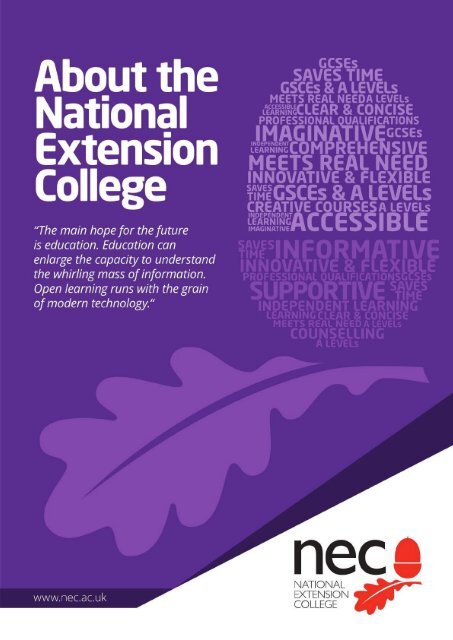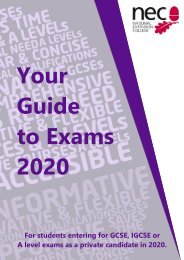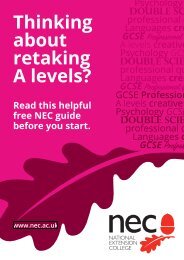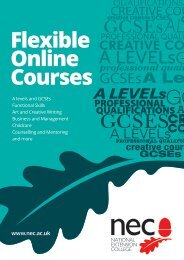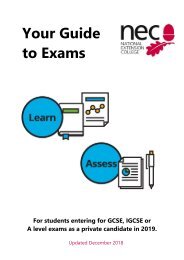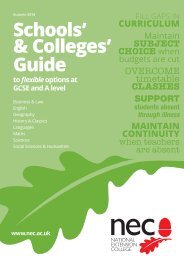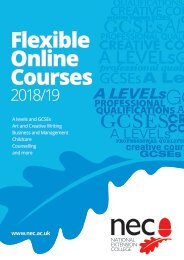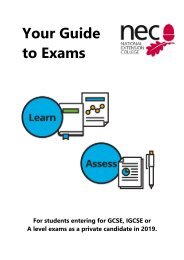About the National Extension College
Create successful ePaper yourself
Turn your PDF publications into a flip-book with our unique Google optimized e-Paper software.
Contents<br />
“The ability to learn<br />
and to embrace<br />
change is <strong>the</strong> currency<br />
of <strong>the</strong> future. Learning<br />
gives you confidence<br />
in your abilities and<br />
opens up a world of<br />
possibilities.”<br />
<strong>About</strong> NEC 5<br />
Why NEC? 6<br />
Student success 8<br />
Our learning design 9<br />
Resources and licensing 10<br />
NEC leadership today11<br />
We are proud to work with 12<br />
Awards 14<br />
NEC as campaigner 15<br />
Our students: continuity<br />
and change 16<br />
Our history 18<br />
The future 22<br />
Social impact 23<br />
Get in contact 23<br />
Ros Morpeth<br />
Chief Executive, <strong>National</strong> <strong>Extension</strong> <strong>College</strong><br />
2<br />
3
Michael Young<br />
Lord Young of Dartington<br />
<strong>About</strong> NEC<br />
Michael Young believed in <strong>the</strong><br />
power of open learning to widen<br />
participation. In <strong>the</strong> early 1960s he<br />
identified a generation of adults<br />
whose lives had been disrupted by<br />
<strong>the</strong> Second World War, who would<br />
want to come back to education but<br />
would need <strong>the</strong> educational provision<br />
to fit around <strong>the</strong>ir lives.<br />
A social entrepreneur and Labour<br />
politician, he founded <strong>the</strong> <strong>National</strong><br />
<strong>Extension</strong> <strong>College</strong> (NEC) along with Brian<br />
Jackson in 1963 and used his vision and<br />
energy to get many initiatives designed<br />
to help individuals and families off<br />
<strong>the</strong> ground. These included <strong>the</strong> Open<br />
University and International <strong>Extension</strong><br />
<strong>College</strong> – both of which had particular<br />
links to NEC; <strong>the</strong> University of <strong>the</strong> Third<br />
Age; International Research Foundation<br />
for Open Learning (IRFOL); <strong>the</strong> Open<br />
School and <strong>the</strong> Open <strong>College</strong> of <strong>the</strong><br />
Arts; <strong>the</strong> Consumers’ Association<br />
(WHICH); and <strong>the</strong> Advisory Centre for<br />
Education (ACE).<br />
With his charismatic leadership and<br />
forward-looking attitude, Michael Young<br />
was a visionary ahead of his time.<br />
“I would add to <strong>the</strong><br />
mantra of open<br />
learning, ‘open as<br />
to people, places,<br />
methods and ideas’ –<br />
open to experiment,<br />
especially anything<br />
that adds to its<br />
humanity.”<br />
Michael Young<br />
Writing in <strong>the</strong> Times Higher Educational<br />
Supplement in 2001<br />
A pioneer of distance learning <strong>the</strong> <strong>National</strong> <strong>Extension</strong> <strong>College</strong><br />
(NEC) exists to transform lives through education.<br />
Founded in 1963 by Michael Young and Brian Jackson as a forerunner<br />
for <strong>the</strong> Open University, NEC is a long-standing independent<br />
educational charity and part of <strong>the</strong> Open School Trust.<br />
Offering educational opportunities and second-chance learning to<br />
people for whom attending regular classes at school or college would<br />
not be possible, NEC today has a tried and tested model that supports<br />
<strong>the</strong> needs of 21st century learners.<br />
For more than 50 years we have forged a reputation for <strong>the</strong> highest<br />
quality learning materials and innovation in distance learning,<br />
alongside a deep commitment to providing exceptional support to our<br />
learners at every stage of <strong>the</strong>ir learning experience.<br />
We also work in partnership with o<strong>the</strong>r organisations, for example<br />
we are <strong>the</strong> trusted partner of schools, colleges, <strong>the</strong> armed forces,<br />
prison service, trainers, companies, and <strong>the</strong> public sector, to provide<br />
high-quality materials and learning programmes.<br />
SPOT<br />
LIGHT<br />
on<br />
Broadcasting<br />
Radio and television broadcasting was a key early relationship to<br />
developing NEC’s courses. ‘After School English’ on BBC radio had<br />
more than 200,000 listeners and 2,000 people registered for NEC’s<br />
accompanying correspondence course; and <strong>the</strong> ‘Gateway’ courses<br />
(page 9) which ran alongside programmes on BBC television in <strong>the</strong><br />
late 1960s were massively successful. Maths and English courses<br />
were supported by two series of TV programmes produced by Anglia<br />
Television resulting in 3,000 enquiries in <strong>the</strong> first eight weeks from<br />
potential students. NEC continued to work closely with broadcasters<br />
and in 1981 launched a computer literacy programme with <strong>the</strong> BBC<br />
which became a Sunday Times Bestseller (see page 22).<br />
We are proud of our history and our values<br />
at NEC. More than fifty years of education<br />
– a lifeline to many students who need <strong>the</strong><br />
flexibility that NEC provides.<br />
4 <strong>National</strong> <strong>Extension</strong> <strong>College</strong> 5
Brian Jackson<br />
Co-founder of <strong>the</strong> <strong>National</strong><br />
<strong>Extension</strong> <strong>College</strong>, Brian<br />
Jackson nurtured NEC<br />
from his role as director<br />
of <strong>the</strong> Advisory Centre for<br />
Education (ACE).<br />
In NEC’s first ten years he<br />
used his skills as a writer,<br />
educator, publicist and<br />
fundraiser to support NEC,<br />
and <strong>the</strong> college was launched<br />
by an article in ACE’s<br />
magazine ‘Where?’ in <strong>the</strong><br />
autumn of 1963.<br />
He went on to help found <strong>the</strong><br />
<strong>National</strong> Children’s Centre<br />
and proposed a series of<br />
television programmes to <strong>the</strong><br />
BBC which in turn led to <strong>the</strong><br />
foundation of <strong>the</strong> <strong>National</strong><br />
Childminding Association,<br />
now called <strong>the</strong> Professional<br />
Association for Childcare and<br />
Early Years (PACEY).<br />
Why NEC?<br />
NEC makes<br />
education flexible<br />
and available to<br />
everyone.<br />
This means that whatever<br />
someone’s age, background,<br />
culture or circumstance we<br />
are here to provide access<br />
to flexible courses and<br />
resources including GCSEs,<br />
A levels and professional<br />
qualifications to help <strong>the</strong>m<br />
achieve <strong>the</strong>ir future goals.<br />
Brightest innovators and leading experts in lifelong learning<br />
As an educational charity committed to learning for everyone at every stage in <strong>the</strong>ir<br />
lives, we campaign to keep access to lifelong learning open for all.<br />
NEC has kept at <strong>the</strong> forefront of innovation in <strong>the</strong> education sector – developing new<br />
resources, partnerships and initiatives to widen opportunities to learn.<br />
The highest quality resources<br />
Our high-quality learning resources have been carefully designed to provide engaging<br />
content that develops interest in <strong>the</strong> subject.<br />
• A levels and GCSEs in more than 20 subjects.<br />
• Professional qualifications for teaching and learning, business and management,<br />
book-keeping, counselling, childcare and playwork.<br />
• Art and creative writing.<br />
The most successful approach to learning<br />
We innovate to prepare students for a bright future in an ever-changing world.<br />
Our resources provide a proven activity-based approach to learning developed over<br />
many years, to support learning needs and develop study skills that prepare students<br />
for higher education and employment.<br />
The most dedicated staff and authors<br />
At <strong>the</strong> core of NEC is a team of experienced professionals committed to working<br />
toge<strong>the</strong>r to provide excellent service.<br />
• Materials are designed and written by experienced authors who are qualified<br />
subject experts and have contributed <strong>the</strong>ir knowledge and academic expertise.<br />
• Our excellent tutors also help with authoring and consultancy and bring first-hand<br />
experience of students’ needs.<br />
• Our staff are at <strong>the</strong> centre of what we do. They work to provide a first-class service<br />
and are always looking for ways to improve how NEC provides and delivers education.<br />
The culture of NEC is one of friendliness, hard work, informality and respect.<br />
We are fortunate to work with staff, authors, tutors, directors<br />
and trustees of <strong>the</strong> very highest calibre.<br />
SPOT<br />
LIGHT<br />
on<br />
GCSE Astronomy<br />
As a hobby or an interesting choice<br />
of career, astronomy develops<br />
valuable scientific, ma<strong>the</strong>matical and<br />
engineering skills. Over centuries it<br />
has inspired great works of art and<br />
fiction, philosophy and politics. In 2018<br />
NEC introduced this fascinating online<br />
course, enabling students to explore <strong>the</strong><br />
universe and our position in it.<br />
“The <strong>National</strong> <strong>Extension</strong> <strong>College</strong> is<br />
a unique institution which enables many<br />
adults to acquire <strong>the</strong> qualifications and skills<br />
<strong>the</strong>y need to lead happy and productive lives.”<br />
Ruth Spellman – Chief Executive WEA<br />
6 <strong>National</strong> <strong>Extension</strong> <strong>College</strong> 7
Student success<br />
Julia<br />
Elliot<br />
Najma<br />
Julia left formal education at <strong>the</strong> age of<br />
15 when her fa<strong>the</strong>r was offered a job in<br />
Belgium and <strong>the</strong> family went to live <strong>the</strong>re.<br />
Her parents turned to home education,<br />
and Julia took maths GCSE and A levels<br />
including French and classical civilisation<br />
with NEC. She <strong>the</strong>n studied for a BA in<br />
classical and archaeological studies with<br />
French at <strong>the</strong> University of Kent and<br />
a Masters in ancient history at King’s<br />
<strong>College</strong> London.<br />
Elliot studied GCSEs and IGCSEs<br />
including maths, plus A levels in politics,<br />
history and law with NEC. After studying<br />
law at Cambridge and <strong>the</strong>n a law post<br />
graduate at Harvard, he now works for a<br />
large law practice in New York.<br />
Having previously studied with <strong>the</strong><br />
Open University, Najma was familiar<br />
with distance learning. Needing to fit<br />
her study around childcare, she studied<br />
maths and English GCSE with NEC in<br />
order to access a place on a PGCE<br />
course.<br />
“It’s down to NEC that I was<br />
able to go to university and<br />
study <strong>the</strong> subject I have loved<br />
since being a child. I’m sure my<br />
life would have taken a very<br />
different course without home<br />
education.”<br />
“NEC offers a wide range of<br />
subject options, has thorough<br />
and complete courses and<br />
a good support network. I<br />
enjoyed learning new things<br />
and knowing that I was working<br />
towards a goal, which for me<br />
was to attend university.”<br />
“The flexibility of <strong>the</strong> course<br />
was a definite highlight. From<br />
day one I was guided stepby-step<br />
and I could call my<br />
tutor for help when I didn’t<br />
understand something. I<br />
felt I had <strong>the</strong> whole package<br />
studying with NEC.”<br />
Our learning<br />
design<br />
NEC has always been at <strong>the</strong> leading edge of open<br />
and distance learning, and we believe that our<br />
model of carefully designed courses and resources<br />
provides students with <strong>the</strong> best chance of success.<br />
Materials are specially written and structured for<br />
independent study, with engaging content that<br />
develops a genuine interest in <strong>the</strong> subject.<br />
Course development team<br />
Our expert teams of course developers are<br />
made up of teachers and writers with knowledge<br />
of how to write materials that are excellent for<br />
independent learning. As well as <strong>the</strong> content of<br />
<strong>the</strong> specifications, <strong>the</strong>y know <strong>the</strong> assessment<br />
requirements, understand <strong>the</strong> exams and <strong>the</strong><br />
questions that will be asked, and how awarding<br />
bodies mark <strong>the</strong> answers. Many of our course<br />
development team are course tutors and have<br />
experience as examiners for <strong>the</strong> awarding bodies.<br />
Meeting <strong>the</strong> specifications<br />
Our course developers cover <strong>the</strong> specification<br />
fully, but in a way that aids learning. Knowledge,<br />
understanding and skills are built step-by-step<br />
giving students <strong>the</strong> opportunity to test and check<br />
<strong>the</strong>ir progress and see how what <strong>the</strong>y learn links to<br />
<strong>the</strong> specification and assessment requirements.<br />
Launched in 1968, <strong>the</strong>se three courses: ‘Reading to Learn’; ‘Man in<br />
Society’; and ‘Square 2’, prepared students to go on to study with <strong>the</strong><br />
Open University and were an immediate success. Nearly four-and-half<br />
thousand students enrolled on <strong>the</strong>se courses in <strong>the</strong> first year.<br />
Key<br />
features<br />
Course approach:<br />
● arranged in sections<br />
and topics<br />
● provide short “chunks”<br />
of learning<br />
● activities and selfchecks<br />
with feedback<br />
● clear learning objectives<br />
● study and exam hints<br />
● assignments for<br />
marking by tutors.<br />
Support and<br />
preparation for exams:<br />
● assessment guidance<br />
● exam hints and tips<br />
● exam-style questions<br />
● exemplar answers<br />
● revision section.<br />
SPOT<br />
LIGHTon<br />
‘Gateway’<br />
courses<br />
8<br />
<strong>National</strong> <strong>Extension</strong> <strong>College</strong><br />
9
Peter Laslett<br />
Along with Michael Young and Brian Jackson, Peter Laslett supported <strong>the</strong> idea<br />
of <strong>the</strong> <strong>National</strong> <strong>Extension</strong> <strong>College</strong> and he remained a trustee until 1990.<br />
A close associate of Michael Young, he became a leading figure in <strong>the</strong> movement to<br />
widen access to education and established a worldwide reputation as an historian<br />
and innovative thinker. Peter was also involved in establishing <strong>the</strong> Open University<br />
and <strong>the</strong> University of <strong>the</strong> Third Age. Michael Young described him as, “...an academic<br />
of high-standing, intensely interested in <strong>the</strong> people who do not get to <strong>the</strong>ir universities”.<br />
Resources<br />
and licensing<br />
Licensed resources offer a<br />
flexible approach to supporting<br />
blended and online learning,<br />
face-to-face teaching, small<br />
group work, revision support<br />
and home study. It’s up to you<br />
how you draw on our vast bank<br />
of resources.<br />
We have a long track record of working<br />
in partnerships across <strong>the</strong> fur<strong>the</strong>r<br />
education (FE) and skills sector. Licensing<br />
NEC resources can enable you to benefit<br />
from a proven activity-based approach<br />
to learning, developed over many years.<br />
“With NEC <strong>the</strong> course<br />
follows <strong>the</strong> student,<br />
<strong>the</strong>y can carry on<br />
studying wherever<br />
<strong>the</strong>y are. Flexibility like<br />
that is hard to find.”<br />
Specialist school for students with<br />
Asperger’s Syndrome<br />
NEC leadership today<br />
Dr Ros Morpeth – Chief Executive<br />
A second-chance learner herself, who went to university as a mature student,<br />
Ros has had two spells as Chief Executive of <strong>the</strong> <strong>National</strong> <strong>Extension</strong> <strong>College</strong>.<br />
She joined NEC in <strong>the</strong> late 1970s and after working in a variety of educational<br />
roles, she first took over as Chief Executive in 1987. After leaving in <strong>the</strong> early 2000s<br />
believing she had ‘probably done everything’ she could for NEC, Ros worked for<br />
international agencies like UNICEF and UNESCO to help developing countries<br />
use flexible learning to reach out to <strong>the</strong> most hard to reach. When, as part of <strong>the</strong><br />
Learning and Skills Network (LSN), NEC went into administration in late 2011, Ros<br />
headed up a group of colleagues determined to save NEC.<br />
Stepping back into <strong>the</strong> organisation as full-time Chief Executive on a voluntary basis,<br />
Ros has contributed her long experience of distance learning and ensured NEC<br />
continues its work as an educational charity meeting <strong>the</strong> needs of those who have<br />
missed out on education and need a second chance. Ros was awarded an OBE for<br />
services to fur<strong>the</strong>r education in <strong>the</strong> 2015 Queen’s Birthday Honours.<br />
Trustees<br />
NEC is guided by a board of trustees who work on a voluntary basis.<br />
They are responsible for guiding NEC’s overall direction and meet regularly to discuss<br />
how to support its work.<br />
Richard Dorrance – Chair of Trustees<br />
Richard spent decades in a variety of education roles including teaching<br />
and advising.<br />
Before retiring he spent 19 years as Chief Executive and Company Secretary of CACHE.<br />
He brings to <strong>the</strong> Board his experience of running a charity and supporting students,<br />
many of whom have ei<strong>the</strong>r not achieved in a school environment or who are<br />
adult returners to education.<br />
SPOT<br />
LIGHT<br />
FlexiStudy<br />
on<br />
Launched in 1979 at its peak this annual<br />
subscription scheme involved more than<br />
140 fur<strong>the</strong>r education (FE) colleges who<br />
adopted NEC courses as part of <strong>the</strong>ir<br />
open and distance learning provision,<br />
enabling <strong>the</strong>m to enrol learners unable<br />
to attend college on a regular basis.<br />
We remain committed to our<br />
founder’s vision to create: ‘...education without<br />
institution, learning while earning, courses which people<br />
of all ages can take in <strong>the</strong>ir own time, at <strong>the</strong>ir own pace.’<br />
10<br />
<strong>National</strong> <strong>Extension</strong> <strong>College</strong> 11
We are proud<br />
to work with...<br />
“For students<br />
who need a<br />
flexible route<br />
to those<br />
essential GCSE<br />
and A level<br />
qualifications,<br />
<strong>the</strong> <strong>National</strong><br />
<strong>Extension</strong><br />
<strong>College</strong><br />
is a hidden<br />
treasure and a<br />
superb option.”<br />
Mary Curnock Cook<br />
Former Chief Executive<br />
of UCAS<br />
At a national level and beyond, we work collaboratively with o<strong>the</strong>r<br />
organisations to access <strong>the</strong> latest developments in <strong>the</strong> world of<br />
education and to campaign on issues affecting distance learners.<br />
The Open University (OU)<br />
NEC has a shared history with <strong>the</strong> OU, and we have a formal Memorandum of<br />
Understanding which provides a framework for our collaboration. Both organisations<br />
share an ethos and mission to widen participation through distance learning,<br />
particularly for part-time students.<br />
unionlearn<br />
Distance learning is ideal for people who want to continue working while <strong>the</strong>y study.<br />
unionlearn works with unions to provide learning opportunities for its members. We<br />
work closely toge<strong>the</strong>r to ensure its members are able to access NEC courses.<br />
The Prisoners’ Education Trust (PET)<br />
We work with PET to provide access to educational opportunities for prisoners,<br />
enhancing <strong>the</strong>ir chances of building a better life after release reducing <strong>the</strong> likelihood<br />
of reoffending.<br />
Prisoner Learning Alliance (PLA)<br />
NEC is pleased to be a member of <strong>the</strong> PLA. Membership of <strong>the</strong> PLA brings toge<strong>the</strong>r<br />
organisations and individuals to inform prison education priorities, policies and<br />
practices, so that all prisoners can engage in high-quality and diverse learning<br />
opportunities to help <strong>the</strong>m transform <strong>the</strong>ir lives.<br />
International Examination Officers Association (IEOA)<br />
We work in partnership with <strong>the</strong> IEOA, an independent charity whose role is to<br />
support and develop exams delivery throughout <strong>the</strong> UK, to provide support and<br />
guidance for external candidates for exams.<br />
The WEA<br />
Both <strong>the</strong> WEA and NEC were set up to address educational inequalities faced by<br />
ordinary working people. WEA is <strong>the</strong> largest voluntary sector provider of adult<br />
education in <strong>the</strong> UK. We work toge<strong>the</strong>r to promote and campaign for widening<br />
access to lifelong learning.<br />
UCAS<br />
We have worked in partnership with UCAS, an independent charity that supports young<br />
people making choices after GCSE and those applying to university, to develop a series<br />
of study skills guides to help students make a successful transition to higher education.<br />
European Association for Distance Learning (EADL)<br />
Members of EADL, <strong>the</strong> European association of schools, institutions and individuals<br />
working in correspondence and distance education, must meet its quality standards<br />
and comply with its code of conduct. Europe-wide, EADL membership is regarded as<br />
a seal of quality.<br />
Campaign for Learning<br />
We are proud to be classified as a friend of <strong>the</strong> Campaign for Learning, a charity<br />
which champions <strong>the</strong> cause of lifelong learning to create a society where participation<br />
in learning is recognised as <strong>the</strong> key to improving life chances and fulfilling potential.<br />
Ma<strong>the</strong>matics Education Innovation (MEI)<br />
We are pleased to be working with MEI, an independent national charity committed<br />
to improving maths education, to offer an online course for A level Fur<strong>the</strong>r Maths.<br />
The Big Issue<br />
We are working with The Big Issue on a bursary scheme to give magazine vendors<br />
interested in studying <strong>the</strong> chance to enrol on an NEC course and boost <strong>the</strong>ir employability.<br />
Association for Art History (AAH)<br />
AAH exists to provide an inclusive and broad approach to <strong>the</strong> study of art history.<br />
NEC is delighted to be working in partnership with AAH to widen participation in<br />
<strong>the</strong> subject by developing an innovative online course for <strong>the</strong> new A level History<br />
of Art specification.<br />
Awarding bodies<br />
NEC has strong links with UK awarding bodies and works with <strong>the</strong>m to maintain strict<br />
compliance with <strong>the</strong>ir quality and assessment guidelines.<br />
• AQA<br />
• NCFE Cache<br />
• Cambridge Assessment International Education (CAIE)<br />
• Chartered Management Institute (CMI)<br />
• Oxford Cambridge and RSA (OCR)<br />
• Pearson Edexcel<br />
• Training Qualifications UK (TQUK)<br />
For more than 15 years we have been working with schools and<br />
colleges to offer <strong>the</strong>ir students a wider subject choice, resolve<br />
timetable clashes and overcome staff shortages<br />
“NEC’s<br />
approach with<br />
1:1 tuition for<br />
every student<br />
provided as<br />
part of <strong>the</strong><br />
course, means<br />
we don’t<br />
have to give<br />
a thought to<br />
timetabling,<br />
teaching<br />
time, marking<br />
pupils’ work, or<br />
preparing <strong>the</strong>m<br />
for exams.”<br />
Director of Studies at a<br />
specialist music school<br />
SPOT<br />
LIGHTon<br />
Schools and<br />
<strong>College</strong>s<br />
12<br />
<strong>National</strong> <strong>Extension</strong> <strong>College</strong><br />
13
Sir Alan Tuckett<br />
OBE<br />
An adult education pioneer<br />
who has campaigned<br />
successfully over many<br />
years on <strong>the</strong> value of adult<br />
learning, Sir Alan Tuckett<br />
was an NEC trustee during<br />
<strong>the</strong> 1990s, and former Chief<br />
Executive of NIACE.<br />
Internationally recognised as<br />
a leader in lifelong learning,<br />
he was involved in starting<br />
<strong>the</strong> British adult literacy<br />
campaign in <strong>the</strong> 1970s and<br />
launched Adult Learners’<br />
Week in 1992.<br />
A past President of <strong>the</strong><br />
International Council of Adult<br />
Education, he is an Honorary<br />
Fellow of UNESCO’s Institute<br />
of Lifelong Learning, and<br />
Professor of Education at <strong>the</strong><br />
University of Wolverhampton.<br />
Awards<br />
Open to all FE providers,<br />
<strong>the</strong> Times Educational<br />
Supplement (TES) awards<br />
showcase <strong>the</strong> very best in <strong>the</strong><br />
fur<strong>the</strong>r education sector.<br />
FE Leader of <strong>the</strong> Year:<br />
Winner, 2014<br />
NEC’s Chief Executive Ros Morpeth<br />
was named TES FE Leader of <strong>the</strong> Year<br />
in 2014, chosen from <strong>the</strong> shortlist of<br />
six people nominated because of her<br />
“tenacity and inspirational leadership”.<br />
Fur<strong>the</strong>r Education<br />
Marketing and<br />
Communications<br />
Campaign of <strong>the</strong> Year<br />
Award: Nominee, 2016<br />
NEC was shortlisted for this award<br />
following a successful campaign for<br />
a public exam system that works<br />
for everyone, which brought about<br />
a change in <strong>the</strong> way that non-exam<br />
assessments (NEA) for A level and GCSE<br />
students are carried out (see page 15).<br />
NEC as campaigner<br />
We work hard to make access to education easier for all distance<br />
learning students, collaborating with o<strong>the</strong>r organisations to<br />
access <strong>the</strong> latest developments in <strong>the</strong> world of education and<br />
campaigning on issues affecting distance learners.<br />
A public exam system that works for everyone<br />
Our 2016 campaign for a public exam system that works for everyone was successful<br />
in bringing about a change in <strong>the</strong> way non-exam assessments (NEA) for A level and<br />
GCSE qualifications are carried out. As a result of <strong>the</strong> changes in procedure made by<br />
<strong>the</strong> exam boards, private candidates can now study mainstream subjects on an equal<br />
footing with pupils in schools and colleges.<br />
The campaign was supported by <strong>the</strong> Times Educational Supplement (TES), WEA, UCAS<br />
and <strong>the</strong> Open University, with <strong>the</strong> TES describing it as a “terrible blow averted for distance<br />
learners”. Following <strong>the</strong> successful campaign, NEC was nominated for <strong>the</strong> TES Fur<strong>the</strong>r<br />
Education Marketing and Communications Campaign of <strong>the</strong> Year Award (see page 14).<br />
Removing barriers and reversing <strong>the</strong> decline in <strong>the</strong><br />
number of students studying part-time<br />
NEC is one of <strong>the</strong> voices campaigning to reverse <strong>the</strong> decline in <strong>the</strong> number of students<br />
studying part-time, collaborating with <strong>the</strong> Open University to remove barriers for<br />
adults who want to continue studying, and reverse <strong>the</strong> decline in <strong>the</strong> number of adults<br />
entering higher education.<br />
Examinations for external candidates<br />
Back in 1992 NEC spearheaded a successful campaign to keep GCSE examinations for<br />
external candidates. As a result, independent adult learners continue to have access to<br />
<strong>the</strong>se important qualifications.<br />
Visit www.nec.ac.uk to find out more about our campaigning.<br />
SPOT<br />
LIGHT<br />
FlexiStudy<br />
on<br />
NEC’s website<br />
An important source of information for anyone<br />
wanting to open doors to <strong>the</strong>ir future through<br />
learning, NEC’s website provides full details<br />
of our online courses, services and support.<br />
In 2019 we launched a new website to make<br />
information and course details easy to find and<br />
easy to understand by all students regardless<br />
of age and situation.<br />
www.nec.ac.uk<br />
An in-company development and training scheme with<br />
Coca-Cola & Schweppes in 1994 gave 100 school leavers <strong>the</strong><br />
opportunity to work for <strong>the</strong> company’s Frontline Marketing<br />
team at <strong>the</strong> same time as studying for a BSc in management as<br />
an external degree with London University. NEC worked with<br />
Coca-Cola & Schweppes and London University to develop <strong>the</strong><br />
study guides and materials for <strong>the</strong> four-year programme; and to<br />
provide specialist distance tuition, personal study support and a<br />
range of residential schools for <strong>the</strong> external degree students.<br />
SPOT<br />
LIGHTon<br />
Frontline degree<br />
programme<br />
14<br />
<strong>National</strong> <strong>Extension</strong> <strong>College</strong> 15
“Why NEC?<br />
The materials<br />
are set out in a<br />
way that makes<br />
<strong>the</strong>m easy to<br />
understand.”<br />
NEC physics and<br />
biology student<br />
“Why NEC?<br />
Knowledgeable<br />
staff, thorough<br />
and interesting<br />
materials, and<br />
<strong>the</strong> right level of<br />
challenge.”<br />
NEC Business Start-up<br />
student<br />
Our students:<br />
continuity and<br />
change<br />
From our earliest days, NEC has demonstrated an ability to adapt<br />
and evolve to meet <strong>the</strong> challenging requirements of diverse<br />
groups of students and education providers. For more than<br />
50 years we have retained our founding commitment to make<br />
education more accessible to learners who require a second<br />
chance, and to widen access to education for all.<br />
Doing things differently and innovative thinking have been required from day one. We<br />
have always stood for creating better futures by helping people of all ages, from diverse<br />
backgrounds and cultures, to access education through flexible distance learning<br />
courses.<br />
Our first prospectus in 1963 was aimed at women returning to <strong>the</strong> workplace after<br />
having children, and people needing to gain academic or vocational qualifications. The<br />
introduction to our latest Guide to Courses still talks about such aspirations – gaining<br />
qualifications, starting or changing career, or learning for fun.<br />
Course delivery<br />
In our early days radio and television was key to developing NEC’s courses which were<br />
supported by broadcast programmes on radio and TV. From <strong>the</strong> 1980s to 2000s<br />
course materials were provided in huge ringbinders. Today our courses are delivered<br />
via our online learning platform learn@nec – providing all <strong>the</strong> course materials our<br />
students need to study and giving <strong>the</strong>m <strong>the</strong> flexibility to access <strong>the</strong>m whenever and<br />
wherever <strong>the</strong>y choose.<br />
Our students<br />
Since we were founded in 1963 NEC has helped over 750,000 people to improve <strong>the</strong>ir<br />
qualifications, move <strong>the</strong>ir career along to <strong>the</strong> next stage, get into university, fill gaps in<br />
<strong>the</strong>ir education, or simply to enjoy learning. From a student with no qualifications who<br />
went on to become a headteacher to a student in her 90s who studied for an A level<br />
while living in a care home, NEC has supported a wide range of students.<br />
When our first students enrolled in 1963 TV broadcast for only seven-and-a-half hours<br />
a day and colour TV was still four years in <strong>the</strong> future. Now our students talk to each<br />
o<strong>the</strong>r at any time of day using online forums.<br />
There is a world of difference between being a student in <strong>the</strong><br />
mid-20th century and <strong>the</strong> second decade of <strong>the</strong> 21st century,<br />
but <strong>the</strong> people that need <strong>the</strong> flexibility that NEC can offer has<br />
changed less over time.<br />
Gender<br />
1964 1990 2017/18<br />
50.8% female 63.3% female 49.9% female<br />
49.2% male 33.7% male 50.1% male<br />
Age<br />
In <strong>the</strong> 1970s and 1980s <strong>the</strong> average NEC student was in <strong>the</strong>ir mid-30s.<br />
In 1990 most students were aged between 25 and 44.<br />
Today around 44% of NEC’s students are aged 19 to 34 – rising to 60%<br />
if 35 to 44 year olds are included.<br />
The age range of active students in 2017/18 was 13 to 94.<br />
Throughout our history, <strong>the</strong> students that have needed <strong>the</strong> flexibility that<br />
NEC offers have included:<br />
• second-chance learners studying for essential qualifications such as<br />
English and maths<br />
• parents wanting to return to work after raising children or o<strong>the</strong>r caring<br />
responsibilities<br />
• people in employment wanting a change of career and needing to study<br />
part-time<br />
• prisoners determined to make use of <strong>the</strong>ir time inside to improve <strong>the</strong>ir<br />
qualifications<br />
• people with disabilities and carers, for whom accessing courses outside<br />
<strong>the</strong> home may be difficult<br />
• people who work shifts or travel for work and can’t attend regular courses.<br />
From <strong>the</strong> early 2000s onward, we have seen rising numbers of young people<br />
being home educated, with NEC able to offer different options depending on<br />
<strong>the</strong> young learner’s needs.<br />
First published in 1955, and still used today, this<br />
handbook is for police drivers undertaking training but<br />
can also be used by any driver wanting to improve <strong>the</strong>ir<br />
driving skills or take <strong>the</strong>ir advanced driving test. Jointly<br />
produced by The Police Foundation and The Stationery<br />
Office, NEC was involved in <strong>the</strong> design and structure<br />
of <strong>the</strong> 1994 edition of this handbook, to make it more<br />
accessible to <strong>the</strong> general public.<br />
SPOT<br />
LIGHTon<br />
Roadcraft:<br />
The Police Driver’s<br />
Handbook<br />
16<br />
<strong>National</strong> <strong>Extension</strong> <strong>College</strong> 17
1960s:<br />
Foundation<br />
NEC delivered flexible part-time courses for secondchance<br />
learners through distance learning, using distinctive<br />
methods including broadcasting and correspondence,<br />
tailored to <strong>the</strong> needs of distance learning students.<br />
NEC’s first logo<br />
Our<br />
history<br />
Now in its sixth decade,<br />
NEC has had over<br />
750,000 students and<br />
published more than<br />
1,000 titles, evolving<br />
into a more influential<br />
and more permanent<br />
organisation than<br />
Michael Young could<br />
have envisaged in 1963.<br />
1963<br />
Launched by an article<br />
in ‘Where?’, a magazine<br />
published by <strong>the</strong> Advisory<br />
Centre for Education.<br />
1970s:<br />
A time of change<br />
The early 1970s were years of highs<br />
and lows for NEC. Highs included ‘Make<br />
it Count’ a basic numeracy programme<br />
with Yorkshire Television. Lows included<br />
postal strikes as NEC relied on <strong>the</strong> postal<br />
system for all of its work. A growing<br />
number of staff was needed to support<br />
increasing numbers of students, and<br />
in <strong>the</strong> second half of <strong>the</strong> decade <strong>the</strong><br />
publishing of educational resources<br />
became increasingly important.<br />
1971<br />
Education Secretary Margaret<br />
Thatcher awards NEC a grant enabling<br />
courses to continue to be offered in<br />
<strong>the</strong> wake of postage strikes.<br />
1972<br />
1964<br />
Took over <strong>the</strong> University Correspondence<br />
<strong>College</strong>, a pioneer of distance learning,<br />
established in Cambridge in 1887.<br />
1969<br />
Started educating prisoners and working with trade unions.<br />
‘Gateway’ courses with<br />
<strong>the</strong> BBC available as<br />
preparatory courses for<br />
<strong>the</strong> Open University.<br />
1973<br />
NEC’s 10th anniversary, 50,000<br />
students have enrolled on 70<br />
different courses.<br />
1979<br />
1976<br />
1968<br />
8,500 students<br />
enrolled on<br />
correspondence<br />
courses.<br />
Publishing arm added and NEC<br />
begins producing and publishing<br />
its own educational resources.<br />
Launch of ‘FlexiStudy ’, working with FE colleges using<br />
different models of NEC materials in <strong>the</strong>ir teaching.<br />
1980s<br />
Continued >><br />
18<br />
<strong>National</strong> <strong>Extension</strong> <strong>College</strong><br />
19
1980s:<br />
Enhancing learners’<br />
employability<br />
When unemployment reached<br />
three million in <strong>the</strong> early 1980s,<br />
NEC concentrated on publishing<br />
resources that would enhance<br />
individuals’ employability ra<strong>the</strong>r than<br />
developing new programmes in<br />
traditional economic subjects.<br />
1981<br />
‘30 Hour Basic’ programming<br />
course to accompany BBC television<br />
broadcast makes The Sunday Times<br />
Bestseller list.<br />
1983<br />
NEC’s 20th anniversary<br />
2000s:<br />
Learning begins<br />
to move online<br />
By <strong>the</strong> turn of <strong>the</strong> 21st century NEC was<br />
supporting more than 20,000 students a<br />
year on over 150 home-study courses, and<br />
providing a choice of 200-plus learning<br />
resources for colleges, trainers and employers.<br />
2003<br />
NEC’s 40th anniversary<br />
2001<br />
2000<br />
• 10,000 new students<br />
• New online learning platform launched.<br />
• All A level course materials updated to<br />
reflect new AS and A2 specifications.<br />
• NEC moves to The Michael Young Centre<br />
a three-acre site in central Cambridge.<br />
Michael Young attends formal opening<br />
of The Michael Young Centre.<br />
1992<br />
1989<br />
New GCSE courses<br />
created for <strong>the</strong> new<br />
<strong>National</strong> Curriculum,<br />
replacing O level<br />
qualifications.<br />
Campaign to keep<br />
GCSE examinations for<br />
external candidates.<br />
1988<br />
250,000th student enrols on<br />
an NEC course.<br />
1993<br />
1990s:<br />
Work-based learning<br />
The 1990s saw a large increase<br />
in work-based learning projects.<br />
One of <strong>the</strong> most successful was a<br />
degree programme with Coca-Cola<br />
Enterprises that saw hundreds of<br />
<strong>the</strong>ir employees gain qualifications.<br />
NEC’s 30th anniversary<br />
1984<br />
4,000 students on 22 courses<br />
for mature BT technicians.<br />
1997<br />
Development of courses to<br />
support work-based learning.<br />
2010s:<br />
More than 50 years<br />
of supporting learners<br />
After falling into administration following<br />
a merger with <strong>the</strong> Learning and Skills<br />
Network in 2010, NEC is taken over<br />
by The Open School Trust a dormant<br />
Michael Young charity, with support from<br />
NIACE and <strong>the</strong> Open University.<br />
Emerging strongly and in a form closer to<br />
Michael Young’s original social enterprise<br />
model, NEC is able to react quickly to<br />
respond to students’ needs. All courses<br />
are now online. A reformed curriculum<br />
required a complete revision of NEC’s<br />
GCSE and A level courses.<br />
2008<br />
Charitable grant received to develop<br />
a ‘Fun with Food’ project aimed at<br />
encouraging healthy eating with low<br />
income families in East London.<br />
2014<br />
The Times Educational Supplement awards<br />
NEC’s Chief Executive Ros Morpeth <strong>the</strong>ir<br />
FE Leader of <strong>the</strong> Year Award.<br />
2015<br />
• Ros Morpeth is awarded an OBE<br />
for services to fur<strong>the</strong>r education.<br />
• A deal with trade unions gives<br />
<strong>the</strong>ir six million UK members a<br />
discount on NEC courses.<br />
1994<br />
Frontline Degree Programme<br />
with Coca-Cola & Schweppes.<br />
1996<br />
The driving <strong>the</strong>ory test becomes compulsory.<br />
NEC introduces ‘Driving for Life’ to help<br />
learner drivers pass this test.<br />
2013<br />
• NEC’s 50th anniversary<br />
• A new service provides more<br />
structured support to younger<br />
students.<br />
2019<br />
NEC remains <strong>the</strong> major independent not-forprofit<br />
provider of distance education.<br />
The future >><br />
20<br />
<strong>National</strong> <strong>Extension</strong> <strong>College</strong><br />
21
“NEC has kept<br />
at <strong>the</strong> forefront<br />
of innovation,<br />
developing<br />
new resources,<br />
partnerships<br />
and initiatives<br />
to widen<br />
opportunities<br />
to learn as<br />
an adult”<br />
Ros Morpeth<br />
Chief Executive, <strong>National</strong><br />
<strong>Extension</strong> <strong>College</strong> in<br />
Adults Learning<br />
The future<br />
From looking at how technology can enhance distance learning to exploring different<br />
pedagogical methods, innovation continues to drive NEC forward. We will:<br />
• Continue to invest in course development, going back to first principles and thinking<br />
about learning design.<br />
• Increase numbers of students by continuing to make learning available to everyone,<br />
enabling <strong>the</strong>m to apply learning to <strong>the</strong>ir lives by enrolling on distance learning<br />
courses.<br />
• Pilot new ways of learning, giving students access to <strong>the</strong> things <strong>the</strong>y need.<br />
Do what we do now but do it better<br />
• Use technology as a tool to deliver courses in a flexible way and continue to provide<br />
excellent learning support.<br />
• Continue to invest in <strong>the</strong> best curricula, technology and tutors and to share<br />
innovation and resources with <strong>the</strong> wider education sector.<br />
• Ensure <strong>the</strong> relationship between tutor and student remains central to NEC’s<br />
teaching ethic.<br />
• Continue to build a network of partner organisations with whom we can work, to<br />
offer learning opportunities widely to individuals and <strong>the</strong> workforce.<br />
Miranda<br />
Former NEC student Miranda left school<br />
knowing she wanted to go to university but<br />
unsure what subject she wanted to take.<br />
She already had four A levels when she<br />
began studying for A levels in English<br />
literature and classical civilisation with<br />
NEC in order to secure a place to study<br />
classics at Cambridge University. Miranda<br />
swapped courses to study human, social<br />
and political science, before going to<br />
Edinburgh to study for an MsC in <strong>the</strong><br />
evolution of language and cognition.<br />
Social impact<br />
“I suppose what my<br />
educational journey has taught<br />
me is that life is not limiting in<br />
terms of what you can learn<br />
and how you can go about<br />
learning it. Fur<strong>the</strong>r, <strong>the</strong> need<br />
to work does not inhibit study<br />
if you choose <strong>the</strong> right support<br />
networks. The NEC has, thus<br />
far, been <strong>the</strong> best institution to<br />
understand this.”<br />
Get in contact<br />
A 2017/18 survey of our students and alumni showed that:<br />
• 56% had gone on to higher education<br />
• 37.5% had got into work, been promoted at work, or changed career<br />
• 8% were supporting <strong>the</strong>ir children’s education<br />
• 4.5% were enjoying an active retirement.<br />
If you would like to discuss<br />
how NEC can support<br />
your work:<br />
Call: 0800 389 2839<br />
(0)1223 400200<br />
Email: info@nec.ac.uk<br />
www.nec.ac.uk<br />
Our alumni told us of o<strong>the</strong>r outcomes of <strong>the</strong>ir study including:<br />
“It prepared me to have children.”<br />
<strong>National</strong> <strong>Extension</strong> <strong>College</strong><br />
SPOT<br />
LIGHT<br />
on<br />
30-Hour Basic<br />
This 1981 Sunday Times Bestseller was<br />
a joint venture with <strong>the</strong> BBC and part<br />
of its computer literacy programme. It<br />
could be used as a freestanding text for<br />
home study, a correspondence course<br />
with tutor support, or by colleges as part<br />
of <strong>the</strong>ir computer literacy programme.<br />
“I gained <strong>the</strong> confidence to go and do voluntary work.”<br />
“I feel more confident about my place in society.”<br />
“I became ordained.”<br />
“It led me to a better career and a better life.”<br />
“I could help my children on <strong>the</strong> Autistic Spectrum to access education.”<br />
“I went on to train to, and become, a teacher.”<br />
“It kept me mentally active whilst I cared for my husband.”<br />
@NEC_Education<br />
@<strong>National</strong><strong>Extension</strong><strong>College</strong><br />
NEC is <strong>the</strong> trading name of<br />
The Open School Trust, an<br />
independent registered charity.<br />
It is a company limited by<br />
guarantee and registered<br />
in England.<br />
Charity number: 328414<br />
Company number: 02438525<br />
22<br />
<strong>National</strong> <strong>Extension</strong> <strong>College</strong><br />
23


